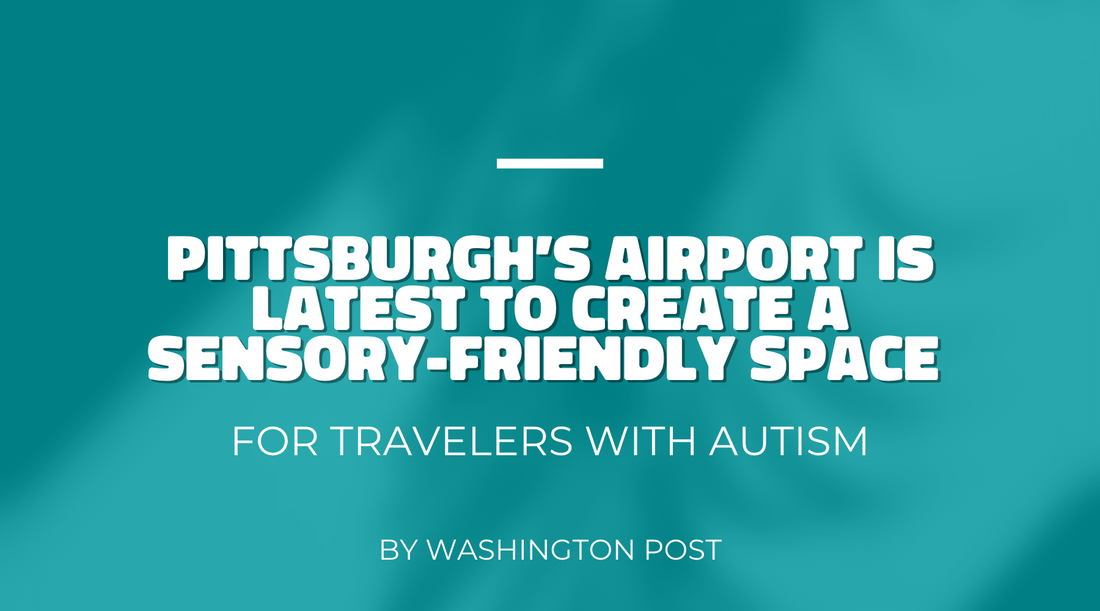“It just worked immediately,” Rudge said, and became a place that both calmed his son and prepared him to interact with other kids. That got Rudge, a heavy-equipment operator, thinking about his workplace: Pittsburgh International Airport. He dropped a note to CEO Christina Cassotis in May 2017.
“As we know, an airport can be a fast-moving, busy and loud environment,” he wrote, noting that some on the autism spectrum can have difficulties adjusting to that level of stimulation. “I also believe that if Pittsburgh International Airport had a sensory room, it would ease the minds of customers knowing that there is a place for their children to go if needed.”
A version of that room — called Presley’s Place — opened on Wednesday, bigger and more comprehensive than anything Rudge had imagined. The 1,500-square-foot space includes a transitional entrance, individual and family rooms, an area for adults and an “airplane experience” complete with a cabin, seats, overhead bins and a jetway.
The new space comes as airports, airlines, destinations, hotels and other tourist attractions step up efforts to serve travelers with autism and their loved ones — though advocates say there is still plenty of room for improvement.

Hartsfield-Jackson Atlanta International Airport opened a multisensory room geared to kids on the autism spectrum in 2016, followed by Shannon Airport in Ireland the following year. London’s Gatwick Airport opened a space “designed for passengers with autism, dementia, cognitive impairment” or other diagnoses in 2018. This year, Birmingham-Shuttlesworth International Airport in Alabama unveiled a “sensory-inclusive room” for travelers, and other airports have designated areas as quiet rooms.
Some programs, such as Wings for Autism, seek to prepare travelers for flying by coordinating rehearsal scenarios in advance with airports, airlines and the Transportation Security Administration. Participants get a boarding pass, go through security and board a plane to familiarize themselves with the process.
The Arc, the nonprofit that organizes Wings for Autism, took the program national five years ago, said Kerry Mauger, senior manager of special projects. She says it’s grown every year since, with more than 150 events in about 65 airports across the country. Mauger says she would love to see every airport in the United States add a sensory room.
“As much practice as you get going through the airport, there still can be other things that happen on the day of your travel,” she says.
At Pittsburgh International Airport, the CEO said no programs were previously in place for those with autism. After getting Rudge’s suggestion, Cassotis said executives put together a team from across departments, drawing in advocacy groups, parents and people on the spectrum. They examined what other public facilities, including hospitals and airport, had already done.
“We wanted to be industry-leading, we wanted to set a standard, we wanted to show folks what’s possible,” she said. Based on the size and scope of the space, along with the simulated airplane experience, the airport believes it has achieved that goal, calling Presley’s Place “first of its kind.”
“What we really came to learn was how important this is, how useful this is, that this was an opportunity for people with sensory processing issues to feel better before they get on a plane,” Cassotis says.

Travelers can access the area by calling the airport’s operation department in real time to get an access code. The airport also allows people who aren’t flying to go beyond security through the MyPITpass program, which means future passengers could visit the space in advance.
Jessica Benham, director of development at the Pittsburgh Center for Autistic Advocacy and an autistic person herself, was involved in early discussions about what the area should include. She said it was important to have space for different kinds of sensory experiences — a venue not just for quiet, but also for people who needed to express themselves through loud sounds or motion.
Also important was that the area was not only geared to children, but had space for adults as well. She said the plane simulation is well suited to help address any uncertainty about what to expect.
“I think that the space is useful for not only a variety of ages of people on the spectrum, but useful for anyone who has anxiety about air travel,” Benham says. “And that may be the thing that I love about the space the most, is that it’s not like they check your diagnosis at the door.”
Benham says so much thought and consideration went into Presley’s Place that it should serve as a model for other airports in the United States and around the world.
“If I lived a little closer to the airport, I would, frankly, go there just to hang in the space,” she says. “It’s that cool.”
By Hannah Sampson
Article From:
The Washington Post

